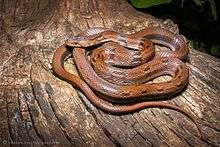Coelognathus helena monticollaris
| Trinket Snake | |
|---|---|
 | |
| Montane Trinket Snake (Coelognathus helena monticollaris) | |
| Scientific classification | |
| Kingdom: | Animalia |
| Phylum: | Chordata |
| Class: | Reptilia |
| Order: | Squamata |
| Suborder: | Serpentes |
| Family: | Colubridae |
| Subfamily: | Colubrinae |
| Genus: | Coelognathus |
| Species: | C. helena monticollaris |
| Binomial name | |
| Coelognathus helena monticollaris | |
| Synonyms | |
| |
Coelognathus helena monticollaris is a non-venomous constrictor subspecies of colubrid snake native to south Central Asia.
Characteristics
A narrow headed slender snake with a beautiful colouration. Its light brown body is often adorned with white and dark brown spots (E.h.helena) or with black and white transverse stripes (E.h.monticollaris). Its head is greenish brown with black markings. However the true purpose of this colouration is camoufladge. Its species name is derived from the legendary Greek queen Helen.
Habitat
Prefers forests but may frequently venture towards human habitation and occasionally enter human dwellings.
Behaviour
Diurnal and highly active. Has a very nasty temper and will strike repeatedly if molested. Never appreciates captivity and will resist capture with utmost tenacity until helplessly overpowered. Its bites are often very damaging due to its inward pointing teeth.
A 1m male specimen caught in Maharashtra, India (near Paud 09/16/13) whipped its tail when agitated. Same specimen was easily handled and carried around the collector's neck without incident.

Food
Feeds mainly on small mammals. It uses its camouflage to stalk its prey and initially disorients its victim with a blitz strike. It then surrounds its prey with its coils and weakens it by biting repeatedly. The victim is finally killed by constriction and swallowed at leisure. It may also prey upon birds, frogs, lizards and other snakes as well but shows a high preference towards small mammals. It is notorious for its voracious appetite. Captive specimens prefer mice and tend to lose interest in lizards especially if they remain motionless.
Breeding
Very little known about its reproductive habits. Probably viviparous. Brood size unknown.
Growth
The smallest known specimens measure around 350mm. The average adult length is around 100 cm and 150 cm the maximum. Females are longer than the males while males have proportionately longer tails.
Venom
Non venomous, this snake kills by constriction.
Identification
- Nine pairs of supralabials of which the fifth and sixth pairs touch the eye.
- 19 to 21 rows of costals two head lengths before the vent.
- Entire anal shield
- Nearly equally sized frontal and parietal shields.
Lepidosis
- Rostral: Compressed and touches six shields.
- Frontal: Relatively thin and elongated.
- Supraoculars: Slender and elongated being nearly as long as the Frontal.
- Parietals: Each individual shield is slightly larger than the Frontal.
- Prefrontals: Highly broad as well as long.
- Internasals: Touch the nostrils.
- Nasals: Divided along a vertical line on which the nostril is situated.
- Loreals: Entire
- Preoculars: Entire
- Postoculars: Divided into two equally sized shields
- Temporals: Divided into two equally sized elongated shields.
- Supralabials: Nine pairs of which the fifth and sixth pairs touch the eye.
- Mental: Stereotype in form.
- Infralabials: Six pairs of which the sixth is the largest.
- Sublinguals: Anterior and posterior pairs equal in size and the posterior pair is separated by smaller scales.
- Costals: Only the ultimate row is enlarged.
- Ventrals: 217 to 265
- Anal Shield: Entire
- Subcaudals: 74 to 97, divided.
Dentition
- Maxillary: 19 to 25
- Palatine: 10 to 14
- Pterygoid: 15 to 30
- Mandibular: 22 to 30
Distribution
Mainly India and Sri Lanka. Also found in Nepal, Pakistan (Sind) and Bangladesh. Fairly common in the central hills of the Sri Lanka above 800m but rarely recorded in the plains.